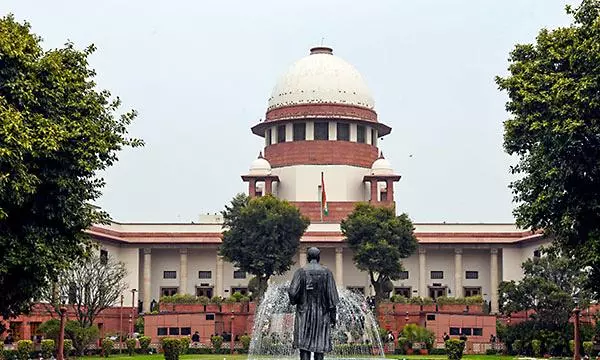
Three-judge SC bench to hear challenges to Places of Worship Act on Dec 12
The Places of Worship Act, 1991 prohibits the conversion of any place of worship to another religion and abates legal proceedings regarding such conversions

A three-judge bench of the Supreme Court will hear on December 12 pleas challenging the validity of the Places of Worship Act that ensures the status quo of all places of worship as they existed on August 15, 1947.
Chief Justice Sanjiv Khanna has constituted a special three-judge bench comprising himself and Justices Sanjay Kumar and KV Vishwanathan to hear the case that has been pending since 2020.
The 1991 legislation
The Places of Worship (Special Provisions) Act, 1991 prohibits the conversion of any place of worship to another religion and abates any legal proceedings concerning such conversions.
Also read: Gyanvapi panel challenges pleas against 1991 Worship Act in SC
That legislation came amid a Hindu nationalist movement that led to the December 1992 destruction of the Babri Masjid in Ayodhya in Uttar Pradesh. A grand Ram temple is now located at the site.
The matter will be heard in the backdrop of several suits filed in various courts, including related to Gyanvapi Mosque in Varanasi, Shahi Idgah Mosque in Mathura and Shahi Jama Masjid in Sambhal, claiming that these were built after destroying ancient temples and seeking permission to offer Hindu prayers there.
The Muslim side in most of these cases have cited the 1991 law to argue that such suits are not maintainable.
BJP leader’s case
The top court is seized of the pleas, including one filed by BJP leader Ashwini Upadhyay who has prayed that sections 2, 3 and 4 of the Places of Worship (Special Provisions) Act, 1991 be set aside. Among the various reasons submitted was the contention that these provisions take away the right of judicial remedy to reclaim a place of worship of any person or a religious group.
As many as six petitions, including those filed by former Rajya Sabha MP Subramanian Swamy, have been filed against the provisions of the 1991 law.
While former Union minister Swamy wanted the apex court to "read down" certain provisions to enable Hindus to stake claim over the Gyanvapi Mosque in Varanasi and Shahi Idgah Mosque in Mathura, Upadhyay claimed the entire statute was unconstitutional and no question of reading down arises.
Also read: 'Unhealthy trend': Chelameswar slams SC's 'flip' on Places of Worship Act
The doctrine of reading down a law is generally used to save a statute from being struck down on account of its unconstitutionality.
The lead petition filed by Upadhyay challenges the constitutional validity of some portions of the Act, saying these not only contravene constitutional articles but also undermine the principle of secularism. He contended that the Act denies judicial remedies for alleged "barbaric acts" of the past.
The Muslim side
On the other hand, Jamiat Ulama-i-Hind had cited the five-judge Constitution bench judgement in the Ram Janmabhoomi-Babri Masjid title case, noting the reference to the Places of Worship (Special Provisions) Act, 1991, to argue that the law cannot be set aside now.
The Gyanvapi Mosque Committee has also filed an application to intervene in the pleas challenging the validity of the Act.
The top court had on March 12, 2022, sought the Centre's response to the plea filed by Upadhyay challenging the validity of certain provisions of the law.
The petition alleged that the 1991 law creates an "arbitrary and irrational retrospective cut-off date" of August 15, 1947, for maintaining the character of the places of worship or pilgrimage against encroachment done by "fundamentalist-barbaric invaders and law-breakers".
Also read: Travesty of justice that secularism not given its due in Ayodhya verdict: Ex-SC judge Nariman
Centre silent on Act
The Gyanvapi committee referred to the Ayodhya temple ruling of the Supreme Court which said that “for any person who seeks solace or recourse against the actions of any number of ancient rulers, the law is not the answer".
But despite repeated notices from the Supreme Court, the Centre has not taken a stand on the Act.
The 1991 law prohibits conversion of any place of worship and provides for the maintenance of the religious character of any place of worship as it existed on August 15, 1947, and for matters connected therewith or incidental thereto.
The law had made only one exception -- on the dispute pertaining to the Ram Janmabhoomi-Babri Masjid in Ayodhya.
(With agency inputs)

